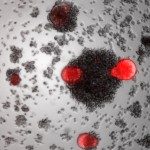Lien vers Pubmed [PMID] – 25537374
J. Gen. Virol. 2015 Apr;96(Pt 4):782-92
There is no large-scale therapy available against human respiratory syncytial virus (hRSV), a major pathogen responsible for acute respiratory diseases. Macaques represent an interesting animal model to evaluate potential treatments because of their genetic, anatomical and immunological proximity with humans. However, the parameters that influence hRSV growth and control in this model are still poorly understood. We have documented in the following study the influence of age as well as repeated infections on the virological, clinical and immunological parameters of this animal model. Following intranasal inoculation, hRSV replicated in the upper respiratory tract for less than 15 days with no clinical signs regardless of age. Interestingly, we observed the induction of a local immune response at the nasal mucosa as assessed by expression profiles of inflammatory and IFN-stimulated genes. Animals also developed specific antibodies and were immune to reinfection. Thus, we showed that even in infant macaques, intranasal hRSV infection induced both local and systemic immune responses to efficiently control the virus.
